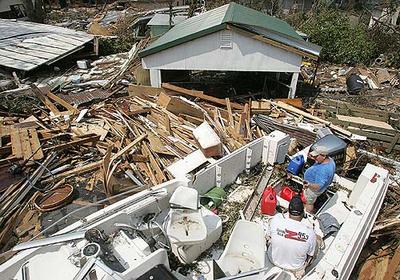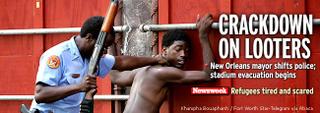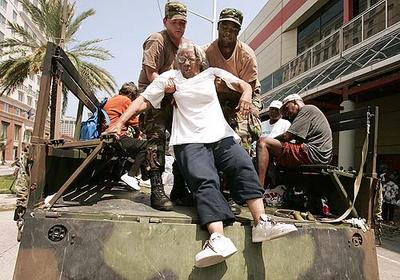Misery and Water Keep Rising
Feeling closer to God up here all safe away from the fear and horror you SON OF A BITCH that is your people down there, the people you are supposed to serve and keep safe, you deplorable little man, you make me want to puke.
Going Fishing guys, sorry that just so cracked me up, now is'nt that just like a man,
















Destruction: New Orleans is deluged; in Mississippi, neighborhoods vanish. Human toll: The dead must wait as stranded survivors plead for rescue. Lawlessness: Looting is out of control.
By Scott Gold, Ellen Barry and Stephen BraunTimes Staff Writers
August 31, 2005
NEW ORLEANS — Across the storm-devastated Gulf Coast, overwhelmed rescue teams and public officials struggled Tuesday to cope with the enormity of Hurricane Katrina's rising toll of chaos and death. New Orleans sank into crisis as floodwaters rushing through breached levees endangered hundreds of storm victims, while searchers in Mississippi's ravaged shore towns recovered 100 bodies and pressed to find scores of missing.
The landscape between New Orleans and Alabama was transformed by wind and surf into stretches of churning floodplain. In New Orleans, two levees broke, leaving 80% of the city flooded.
Hundreds of stranded survivors atop roofs waved frantically to Coast Guard helicopters for salvation from rising waters. At least 3,000 people were rescued in New Orleans, where low-lying neighborhoods were swamped by threatening currents from Lake Pontchartrain, public safety officials said. An untold number of people were missing.
"We've got desperate people shooting in the air, using flares to identify themselves," said New Orleans Mayor C. Ray Nagin. "It's a surreal situation, almost like a nightmare. I hope we wake up from it."
New Orleans reeled from miseries that mounted by the hour: A forlorn Nagin said police and National Guard patrols reported numerous bodies floating in flooded streets. Storm-whipped currents toppled the twin-span bridges over Lake Pontchartrain. An oil tanker ran aground near the city docks.
The city's horizon darkened with black smoke from dozens of fires sparked by downed wires and erupting gas lines. Geysers of gas-fed flame burst out of the water. Houses burned but firefighters were unable to get through blocked roads and freeways.
Crowds broke into stores at will, even making raids on shops in the French Quarter, wheeling off stolen goods in shopping carts while overwhelmed police officials pleaded for public compliance with mandatory curfews. At least 50 people were arrested for looting.
"The looting is out of control," said New Orleans Councilwoman Jackie Clarkson. "We're using exhausted, scarce police to control looting when they should be used for search and rescue while we still have people on rooftops."
Weakened to a tropical depression and tossing off tornadoes as it unraveled through Tennessee, Katrina left more than 4 million people without electricity, utility officials reported.
Analysts estimated storm damage could cost insurers more than $25 billion, the most catastrophic natural disaster in U.S. history. Uninsured losses could add $4 billion to $10 billion more, they said.
President Bush declared parts of Mississippi and Alabama major disaster areas, freeing up federal aid. In a speech to military personnel at the North Island Naval Air Station in Coronado, Calif., Bush called Katrina's aftermath "a trying time" for the people in Mississippi and Louisiana who were most affected.
White House Press Secretary Scott McClellan said there had been "initial discussions" about the president visiting the affected areas by the end of the week.
As federal emergency management teams reached the area, officials contended with widespread breakdowns in public service. Water plants failed and sewers overflowed. Gas lines ruptured and hospitals shut down. Fuel supplies dwindled.
Katrina's human toll presented the most pressing needs. Even the dead had to wait while search teams aided the living. "We're not even dealing with bodies," Nagin said. Searchers were "just pushing them on the side."
As the water rose on Broad Street in east New Orleans, Mousa Harden, 32, the owner of a tire rim accessory shop, clambered into an attic with two relatives. The water kept coming. Harden ripped a fan from the ceiling, using a hammer to carve out a hole in the roof.
They waited for hours until Coast Guard rescuers found them Tuesday morning and lifted them up on a sling into a hovering helicopter. Shoeless and dazed, Harden spent the rest of the day wandering the glass-strewn streets of the city's business district.
"As far as the eye could see, every house was in deep," he said.
The extent of the destruction along the Gulf Coast was apparent early Tuesday.
"At first light, the devastation is greater than our worst fears. It's just totally overwhelming," Louisiana Gov. Kathleen Babineaux Blanco said at a news conference. "We know many lives have been lost," she said, although she had no numbers of confirmed fatalities.
There was no need to guess about deaths in the Mississippi coastal towns of Biloxi and Gulfport and surrounding Harrison County. Katrina leveled a direct hit. Harrison County emergency officials confirmed that 100 people had died, at least 30 in the collapse of a Biloxi apartment house during the height of the storm.
Next >>
Next Jump to page: 1 2 3
Link Here

Going Fishing guys, sorry that just so cracked me up, now is'nt that just like a man,

















Destruction: New Orleans is deluged; in Mississippi, neighborhoods vanish. Human toll: The dead must wait as stranded survivors plead for rescue. Lawlessness: Looting is out of control.
By Scott Gold, Ellen Barry and Stephen BraunTimes Staff Writers
August 31, 2005
NEW ORLEANS — Across the storm-devastated Gulf Coast, overwhelmed rescue teams and public officials struggled Tuesday to cope with the enormity of Hurricane Katrina's rising toll of chaos and death. New Orleans sank into crisis as floodwaters rushing through breached levees endangered hundreds of storm victims, while searchers in Mississippi's ravaged shore towns recovered 100 bodies and pressed to find scores of missing.
The landscape between New Orleans and Alabama was transformed by wind and surf into stretches of churning floodplain. In New Orleans, two levees broke, leaving 80% of the city flooded.
Hundreds of stranded survivors atop roofs waved frantically to Coast Guard helicopters for salvation from rising waters. At least 3,000 people were rescued in New Orleans, where low-lying neighborhoods were swamped by threatening currents from Lake Pontchartrain, public safety officials said. An untold number of people were missing.
"We've got desperate people shooting in the air, using flares to identify themselves," said New Orleans Mayor C. Ray Nagin. "It's a surreal situation, almost like a nightmare. I hope we wake up from it."
New Orleans reeled from miseries that mounted by the hour: A forlorn Nagin said police and National Guard patrols reported numerous bodies floating in flooded streets. Storm-whipped currents toppled the twin-span bridges over Lake Pontchartrain. An oil tanker ran aground near the city docks.
The city's horizon darkened with black smoke from dozens of fires sparked by downed wires and erupting gas lines. Geysers of gas-fed flame burst out of the water. Houses burned but firefighters were unable to get through blocked roads and freeways.
Crowds broke into stores at will, even making raids on shops in the French Quarter, wheeling off stolen goods in shopping carts while overwhelmed police officials pleaded for public compliance with mandatory curfews. At least 50 people were arrested for looting.
"The looting is out of control," said New Orleans Councilwoman Jackie Clarkson. "We're using exhausted, scarce police to control looting when they should be used for search and rescue while we still have people on rooftops."
Weakened to a tropical depression and tossing off tornadoes as it unraveled through Tennessee, Katrina left more than 4 million people without electricity, utility officials reported.
Analysts estimated storm damage could cost insurers more than $25 billion, the most catastrophic natural disaster in U.S. history. Uninsured losses could add $4 billion to $10 billion more, they said.
President Bush declared parts of Mississippi and Alabama major disaster areas, freeing up federal aid. In a speech to military personnel at the North Island Naval Air Station in Coronado, Calif., Bush called Katrina's aftermath "a trying time" for the people in Mississippi and Louisiana who were most affected.
White House Press Secretary Scott McClellan said there had been "initial discussions" about the president visiting the affected areas by the end of the week.
As federal emergency management teams reached the area, officials contended with widespread breakdowns in public service. Water plants failed and sewers overflowed. Gas lines ruptured and hospitals shut down. Fuel supplies dwindled.
Katrina's human toll presented the most pressing needs. Even the dead had to wait while search teams aided the living. "We're not even dealing with bodies," Nagin said. Searchers were "just pushing them on the side."
As the water rose on Broad Street in east New Orleans, Mousa Harden, 32, the owner of a tire rim accessory shop, clambered into an attic with two relatives. The water kept coming. Harden ripped a fan from the ceiling, using a hammer to carve out a hole in the roof.
They waited for hours until Coast Guard rescuers found them Tuesday morning and lifted them up on a sling into a hovering helicopter. Shoeless and dazed, Harden spent the rest of the day wandering the glass-strewn streets of the city's business district.
"As far as the eye could see, every house was in deep," he said.
The extent of the destruction along the Gulf Coast was apparent early Tuesday.
"At first light, the devastation is greater than our worst fears. It's just totally overwhelming," Louisiana Gov. Kathleen Babineaux Blanco said at a news conference. "We know many lives have been lost," she said, although she had no numbers of confirmed fatalities.
There was no need to guess about deaths in the Mississippi coastal towns of Biloxi and Gulfport and surrounding Harrison County. Katrina leveled a direct hit. Harrison County emergency officials confirmed that 100 people had died, at least 30 in the collapse of a Biloxi apartment house during the height of the storm.
Next >>
Next Jump to page: 1 2 3
Link Here




0 Comments:
Post a Comment
<< Home